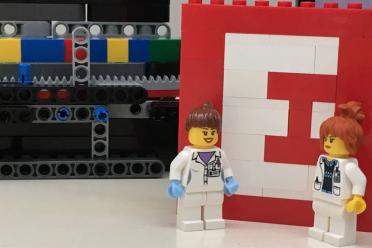
With eight talks on life science research; from pink pigeons and koalas to killer fungus and sexy plants, you can explore the latest genomics techniques and technology that decode our living systems - including live human sequencing, the first ever LEGO DNA “channel” sequencer and a conservation trail!
Ocean Day, 19 October
Dr Tarang Mehta will be appearing at the festival for his second-year, speaking on “A kaleidoscope of colours, shapes and sustainable plates: diving into cichlid fish diversity”. As one of the largest vertebrate families, with at least 1,650 identified cichlid species (estimated 2-3k species overall), the cichlid is a shining example of genetic variation. EI has been studying their diversity in the African Great Lakes to find out more about how the remarkable cichlid has evolved at such an impressive rate.
Nature Day, 20 October
Continuing with vertebrate genomics, Dr Will Nash will be asking: “What can we learn from a high koala-ty genome?”. Alongside their Australian partners, this year, EI played an instrumental part in the first study of the koala genome - a milestone for species conservation and marsupial evolution research. Dr Nash explains EI’s bioinformatics expertise behind this internationally renowned project helping this vulnerable species.
Camilla Ryan will be sharing her insight on the “Pink Pigeon’s Peril” and how EI is leading the revival of a close to the brink species living on the island of Mauritius. Genetically rescuing this unique species, Camilla and the research team partners at UEA are aiming to conserve the endangered pink pigeon by increasing its genetic diversity and tackle the negative impact of inbreeding.
Dr Mark McMullan rounds off Nature Day by discussing another devastated species - the Ash Tree in his talk: “Trees on the brink: evolution of the deadly ash dieback disease”. Detailing how this killer fungus is closing in on our 80 million ash trees in the UK, and how EI is helping to map its genome to seek out resistance genes and stop the pathogen’s population invasion of the beloved ash tree.
Engineering Day, 23 October
Prof Federica di Palma gives an inaugural lecture at the UEA on one of our main specialisms at EI, vertebrate genomics. By studying the unique differences between non-traditional model organisms such as the faithful cichlid and the fluffy bunny, we can identify complex evolutionary traits to discover what sets them apart.
Dr Nicola Patron gives us a new perspective with her talk “Building with Biology”, focusing on the advent of biomanufacturing and using synthetic biology techniques to engineer plant genomes. By drawing genetic information from bio-based products, natural-based alternatives can aid agriculture and medicine.
Technology Day, 24 October
Dr Rob Davey will be sharing his data science wisdom with this talk: “Down the tubes! Data science, the internet, and you”. With the era of ‘big data’ and the huge amounts of data that we process through our supercomputers at EI, Dr Davey asks how is data generated on the cutting-edge of science? How do we keep this open and accessible, and how are you involved.
Dr Peter Bickerton will be hosting an interactive session about the growing underground movement of biohacking and how this can be applied to global food security: “Biohacking: Design your future food”. Previously working at an innovative indoor sustainable farming start-up and a Thought for Food Ambassador, Dr Bickerton delves into how genomic breakthroughs can design your own food.
NRP Day and Family Day, 27 October
Culminating our series of talks, Dr Bickerton will be explaining: “What is the Earlham Institute?” Through a weird and wonderful journey of life on earth, Dr Bickerton will show how EI is making a real-life impact on our future world by decoding living systems through advanced genomics, bioinformatics and mathematics.
To keep things interactive, we will be hosting two original activities. Follow our Pink Pigeon Trail to seek out why and how the species is threatened with extinction. Then go and see our amazing live ‘Ned-ome’ which will analyse human DNA with a groundbreaking portable, real-time genome sequencer, running alongside the first-ever LEGO sequencer which will sort cells to match specific species in our wide catalogue of genome blueprints.
Event lead and Scientific Communications Manager Dr Peter Bickerton, explains the importance of EI's science in a public forum: "It's crucial for scientists to talk about their work with the public, especially when advances such as ones we are showing off at the Science Festival have such relevance to everyday life. Genomics and bioinformatics have the power to revolutionise how we understand not just people, but all life on earth, and that can only help to improve our own lives and the health of the environment. We're excited to showcase this in such an innovative, interactive and fun ways this year!"